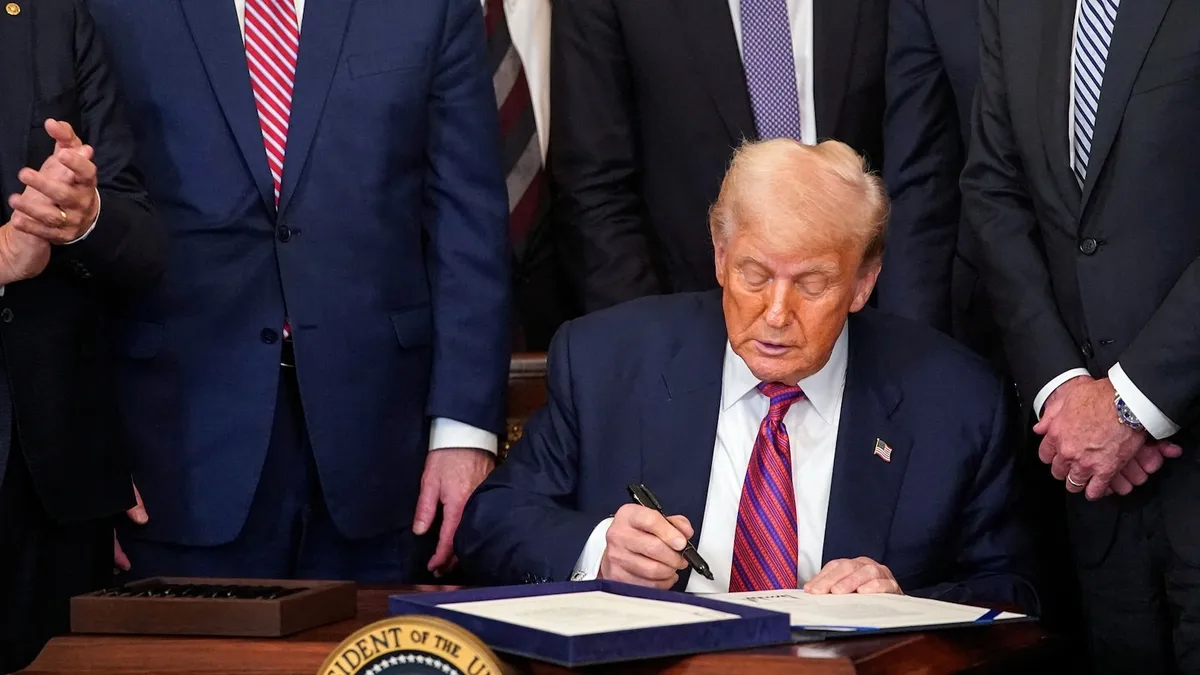
On Friday, President Donald Trump made history by signing the first major federal law governing cryptocurrency. This pivotal legislation, known as the GENIUS Act, aims to regulate a specific type of digital currency called stablecoins. The act has garnered bipartisan support, having been passed by the House of Representatives with overwhelming agreement just a month after it cleared the Senate.
The GENIUS Act represents a significant priority for President Trump, who has shifted from being a cryptocurrency skeptic to positioning himself as the most crypto-friendly commander in chief in U.S. history. On the campaign trail, Trump actively pushed for Congress to address the regulatory landscape of cryptocurrency, emphasizing its importance in boosting the American economy. The legislation specifically aims to make stablecoins more accessible and mainstream, thereby increasing their adoption.
Stablecoins are a type of cryptocurrency designed to maintain a stable value by being pegged to a stable asset, such as the U.S. dollar. The GENIUS Act facilitates easier issuance of these coins by banks and other financial entities, which is anticipated to bolster public trust and enhance the growth of the cryptocurrency industry overall. Traditionally, users purchase stablecoins through personal bank accounts, which they can then trade for more volatile cryptocurrencies like Bitcoin.
Republican Rep. French Hill, chairman of the House Financial Services Committee, expressed pride in the legislative progress, stating, "Our years of diligent work in Congress to bring clarity to payment stablecoins have reached a historic turning point." The bill's passage was notably marked by a nine-hour stalemate among House Republicans before it was finally debated and voted on.
Despite the bipartisan support, several Democrats voiced concerns regarding the legislation. Notably, Rep. Maxine Waters, the ranking member of the House Financial Services Committee, criticized the bill for potentially allowing public officials to promote their personal coins and profit from anonymous transactions. She highlighted a firm with ties to the Trump family that recently launched its own stablecoin, USD1, which is pegged to the U.S. dollar. This firm, World Liberty Financial, has a 60% stake owned by Trump's family, raising questions about potential conflicts of interest.
Waters referred to the legislation as the Unstable Act, suggesting that it creates the illusion of a federal framework for stablecoins without granting the necessary authority to the federal government. In response, World Liberty Financial has stated that it operates as a private company with no direct ties to the U.S. government, aiming to distance itself from any potential controversies.
As President Trump embarks on this new chapter for cryptocurrency regulation, it is important to note that the public may not see immediate changes. Following the president's signature, federal regulators will have a six-month period to develop specific regulations that will shape the cryptocurrency landscape. Additionally, the House has passed the CLARITY Act, which outlines the market structure for assets overseen by the Securities and Exchange Commission and commodities regulated by the Commodities Futures Trading Commission. This measure is now awaiting consideration in the Senate.
In conclusion, the signing of the GENIUS Act marks a significant step toward establishing a regulatory framework for cryptocurrency in the United States, with potential implications for the future of digital currencies like stablecoins.